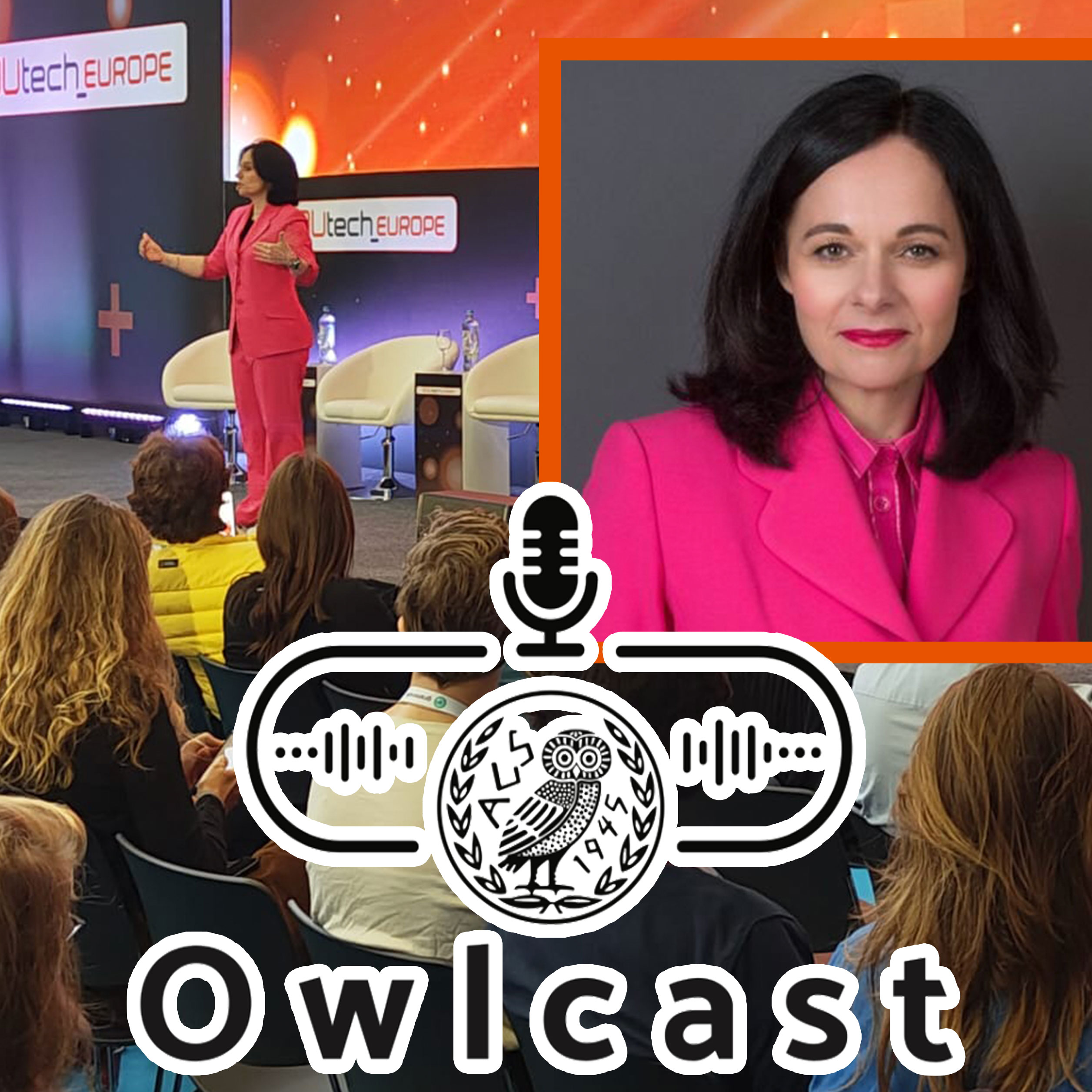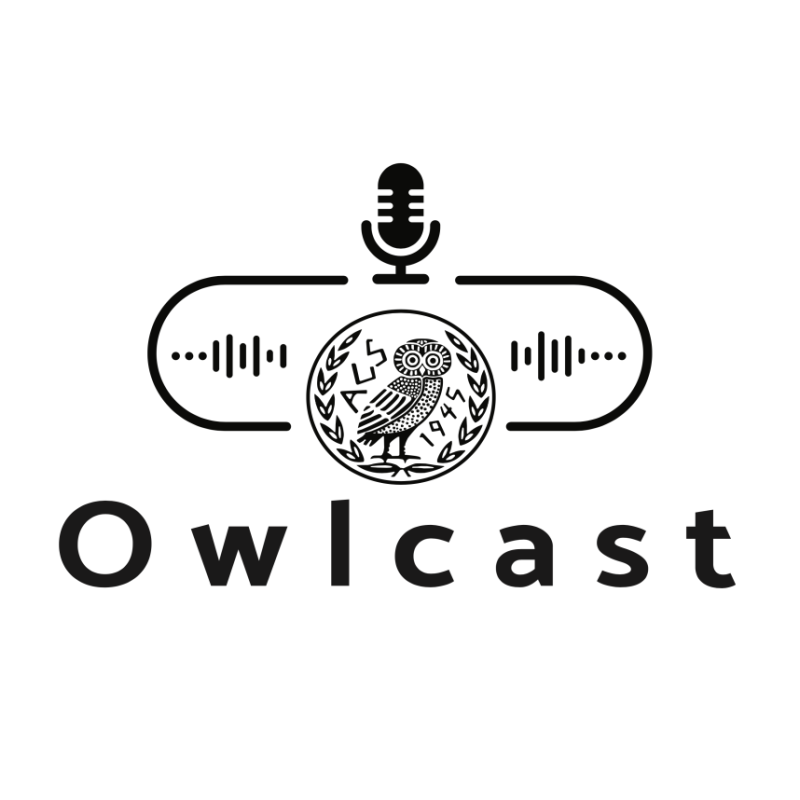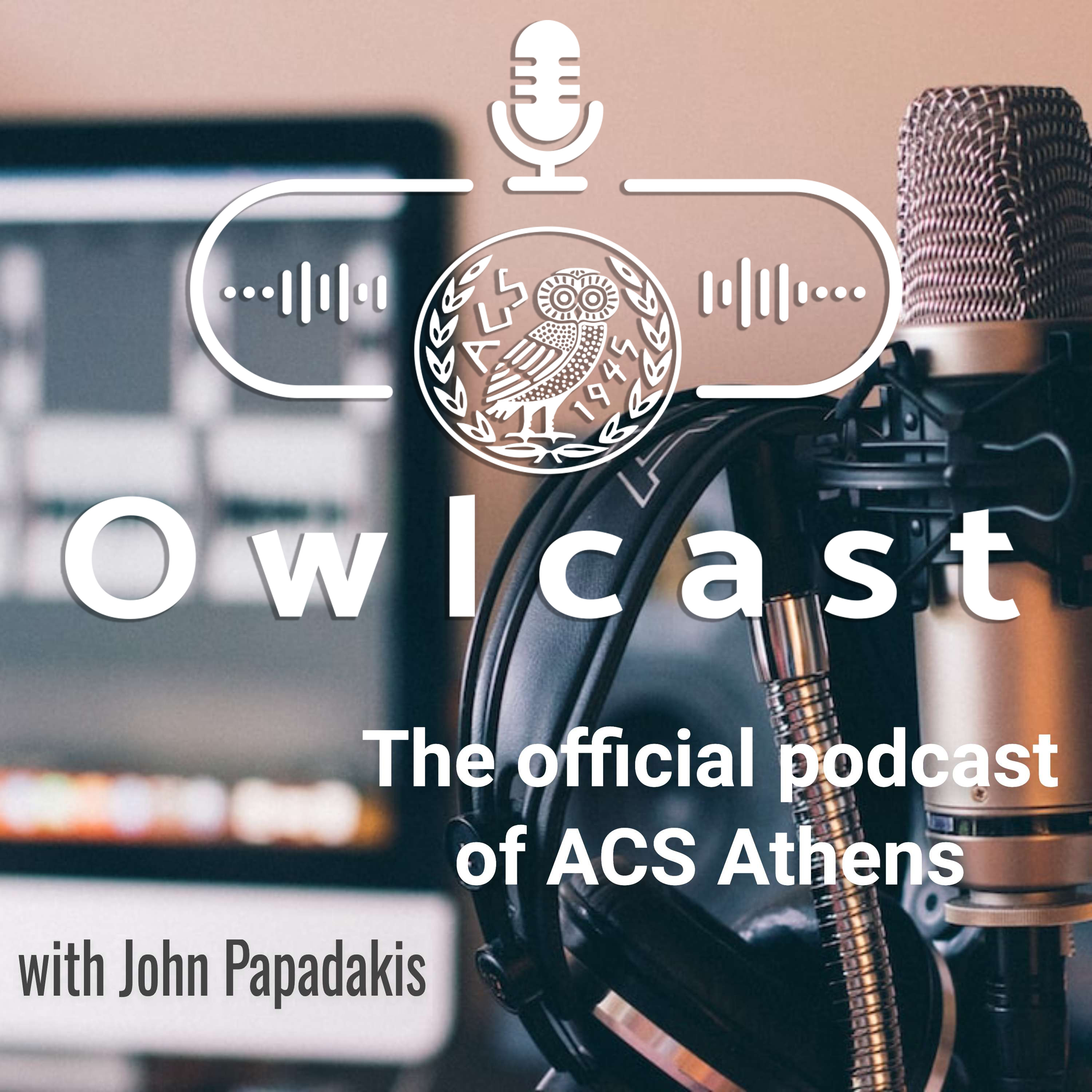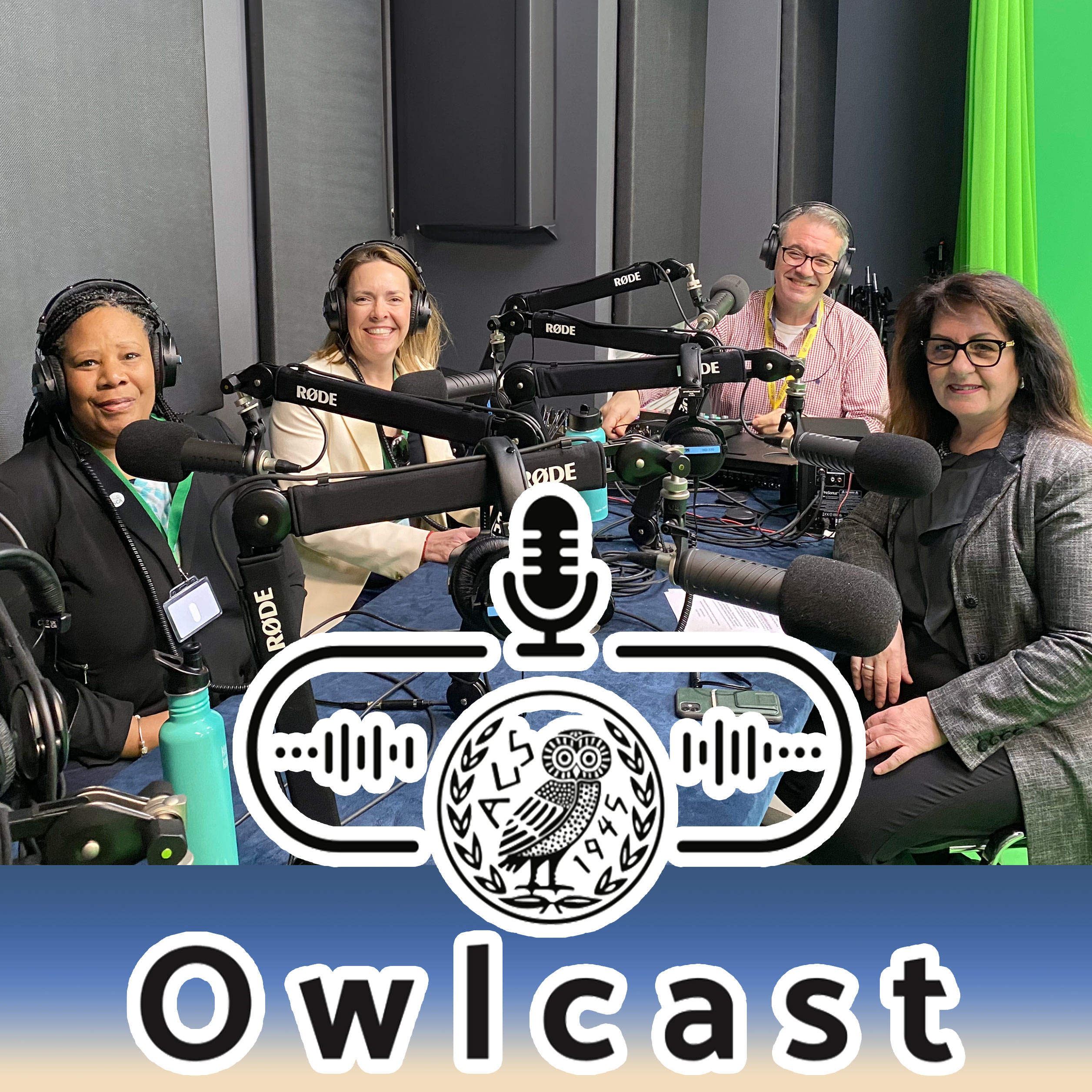Episode Transcript
[00:00:10] Speaker A: This is the owlcast, the official podcast of ACS Athens.
Listen to the exciting story of the American community schools of Athens.
Check out what drives all the members of our international community of learners as we create the education of the future.
Here's John Papadakis.
[00:00:43] Speaker B: Today's guest was one of the keynote speakers at the recent EduTecH Europe Conference in Amsterdam. Her speech was titled the Limits of Knowing Uncertain Futures for Education, and those of us who expected one more presentation with slides were pleasantly surprised as she did not need a slide deck to pass her message through. Our guest today is Kathleen Nagley, an award winning global leader in education for innovative and inclusive practices. She's the head of the International School of Helsinki and a commissioner for NIASC. She's also a fellow podcaster with a show named Unhinged Collaboration. Welcome to the Alcast. An introduction to your keynote mentioned that a paradigm shift in education is upon us that will leave education unmoored from its purpose. That statement alone can be interpreted either as a harbinger of doom or as a welcome promise of imminent change. Also, the title of your keynote, the Limits of Knowing, is quite cryptic. Why is it too provocative to talk about an uncertain future in education, especially regarding the emergence of artificial intelligence?
[00:01:56] Speaker C: Thank you, John, for the question.
When I'm thinking through these topics, I'm wondering about can we change education towards. As you noted, I believe in a more inclusive future, and I'm wondering about how the foundations of education are still based on highly traditional thoughts and practices as why we go to school. And I think that the subject of that speech was about us first examining what are those underpinnings of education that still remain, and wondering if artificial intelligence will remove the need for content transmission, which is much of our education. Even though we've been pushed for many years by educational theory that we need to look at conceptualized learning and conceptual teaching, we're still stuck in an old system of testing around content and skills around content.
When we're looking at the future, I'm wondering what changes may lie ahead if that mission for what has been for schools for so many centuries at this point will be removed, and wondering why we go to school and why should we gather, and what's the importance of.
[00:03:24] Speaker B: The future, do you think? What we need to redefine the purpose? Why do we still need to send our kids to school?
[00:03:31] Speaker C: Yes, I think we need to redefine the purpose. And maybe we've needed to redefine the purpose for a very long time. As I argued in the speech, I think the things that we need to focus on is kind of the innate human needs we have as individuals, that the academics are lowered in priority and the actual physical going to school might be because we need to gather, because we need to have curated experience with deep creativity, and that we need to recognize that much of our learning is embodied, and we need to be hands on and through more a constructivist lens of how we experience education.
[00:04:17] Speaker B: In your speech, you told a story of a dark room. Would you mind sharing it with us? I think it was one of the highlights.
[00:04:29] Speaker C: So I told about how I visited a museum in Berlin a few years ago called the Gropius Baal. And it was an immersive art experience where we were put into jumpsuits, and we were put.
A headset was put on our faces. And I thought it was originally going to be for a VR experience. But what I realized was that they were limiting my ability to see. So I was almost blinded. Only little bit of light could come through.
[00:05:00] Speaker B: Sensory deprivation.
[00:05:02] Speaker C: Sensory deprivation. And when I entered into the space, there was no instructions as to what should happen.
All I knew was I was being put into the suit and then sent off into this other place. I reached out, and there was a rope, which I felt was on the wall. And I stood there frozen and actually in fear as to, like, what am I supposed to be doing and why am I here?
And eventually, I began moving next to that rope. And while I was going through that experience, buzzers and sensors went off in the jumpsuit. At some point, mysterious music was played, and some light was able to flash through this headset. And as I told this story to the audience, one of the things I found in this very strange experience was that there became a sense of joy at some point. Although I did not know what I was entering into and what I was experiencing, I could take a breath at some point and try to imagine what this was all about. And when I came out of the room, when they took the headset, I snuck a peek into the room, and it was an empty, white exhibition space, except for a projector on the ceiling and a rope attached to the wall. And the reason I told this story at the event was, my belief is kind of where we are in terms of education at the moment. We have this opportunity to be putting on this jumpsuit and experiencing something completely different from what we've understood education to be. And we're not sure what that exploration is going to be. We have some hints and ideas of maybe what that will be, but it's my belief that if we are to put on this jumpsuit and enter into these new spaces, we might find some new possibilities, we might find joy, and we might, in my humble opinion, finally do what we've needed to do all along, which is to connect with students at a deep level, at a very human level. And this is why we need to have education.
[00:07:16] Speaker B: That's a very good analogy in the discussion, that we are preparing students for something completely unknown, so we don't yet have the tools to prepare them for the future. So at least we need to be open minded. So you are a leader of an international education institution in Finland. Although international schools are a unique group of schools in mentality and mission, I assume that the Finnish model must have permeated through to your school somehow. Is this a true assumption? Is this an accurate assumption?
[00:07:49] Speaker C: Yes, it is. And I would say that the Finnish system in many ways bolsters what we're doing as an international school.
[00:07:55] Speaker B: In what ways?
[00:07:56] Speaker C: Yeah. Finland, as many would imagine, is a very progressive country.
They're often known for doing very well on PISA scores and such. But what I find very unique about Finnish culture is the way that they really emphasize the independence of young people at a very young age. So it's very typical in Finland that six year olds will go to first grade alone on the subway by themselves in Helsinki. They will travel back and forth to school on their own. And there's a level of deep respect for children. They are autonomous and can have a point of view. And you see this also in education. So Finland's, for example, early years programs, where those are maybe three or four year old children, it's required in the programs that students have voice and choice in their learning, even at that very young age. And we know sometimes a choice can be very simple for a three year old. Do you want to play with this toy or that toy? But it's this sort of recognition of the developmental stages of children that is honored in the Finnish system. And even when students are at the age of 14, for example, they have the right to all of their own data in Finland. So if I were to want to send a child to counseling in our school or anywhere in Finland, I would need the permission from the student for that data transfer. They have the right to control all their health data, and that includes making appointments with the doctors from the age of 14 on and up. So there's this true level of supporting leadership autonomy. There's a real lessening of hierarchies in Finland. And you'll see, for example, that students call their teacher by their first name. And so this kind of lessened hierarchy and creating a sense of that the individual has rights and choices, helps them become better learners, is really fostered in Finland at a young age and definitely is part of our school culture.
[00:10:12] Speaker B: Does this affect the design of curriculum, of the learning outcomes?
[00:10:16] Speaker C: It definitely affects the way that we see curriculum. So we're an, you know, the IB is asking that we promote student agency, that students have this voice and choice in their learning. So this goes hand in hand. So this is a movement in the international kind of curriculum that has already been established in Finland.
So it's also already expected that this should happen. So that means when a teacher is designing something for a classroom, it's not one size fits all. It's trying to understand individual needs and individual pathways and individual ways to demonstrate competency and learning. And this is something that we believe in as a school as well when it comes to learning support and students who might need additional support in our school. So our word inclusive is a very important word to us at our school, and we believe all of us have learning challenges and strengths, and there's no separation of those who are in special needs programs necessarily in our school, part of the regular classroom and fully participating in the regular classroom.
[00:11:39] Speaker A: You are listening to the owlcast, the official podcast of ACS Athens.
[00:12:01] Speaker B: Well, getting back to artificial intelligence now, I mean, that was the talk of the town in the conference and to most conferences about education lately. In your opinion, how should a school engage its community in the discussion about the utility and ethical use of AI from students, from teachers, maybe families, too?
[00:12:19] Speaker C: Well, when chat GPT kind of hit the normal market last January, 1 of the first things we did was that we established a general guidelines for our community about how it might be used in the school. So one of the things that we didn't do is that we didn't ban it, for example, which a lot of schools have done immediately.
One of the things we said was, okay, what do we do in terms of citation with chat GPT and something? The IB even came out with a statement that this is possible.
So how do we use this as a tool and not a crutch? How do we incorporate this in a way that is supporting learning? So we've looked at AI again with learning support. So one of the things you can do with AI is you can put your lesson and say, okay, I have a neurodiverse student in my classroom. How might I alter this lesson? So this would help support their learning in a better way. So this is one conversation we're having from the parents end. Again, it feels very traditional. Parents are wondering about how this is going to lead to cheating and these sorts of things. I think for those of us in education already, we can recognize a chat GPT answer quite easily already. It feels very neutral in some kind.
[00:13:36] Speaker B: Of strange way, especially in the K twelve environment, correct?
[00:13:40] Speaker C: Yes. This feels strange when you're reading an answer, and it could be that you're asking kids, for example, maybe you're having chat GPT somehow support steps for a student. So a student is trying to figure out how to research so they could go to the chat GB and say, I'm interested in researching this topic, how might I go about it? What would be my strategy? And having this honest dialogue? Of course kids can cheat. They've been able to cheat from the internet for a very long time. This is some kind of surprise to educators and they haven't been paying attention because it's very easy to get an essay from around the world if you need that, or to pay for something. What is happening in your classroom, though, where it feels authentic to the learner and that they're engaging in it because it's their true voice and that they want to express their voice. And this is what I'd be arguing as well. If the learner is not expressing their own curiosity in the project, in the work itself, then it's going to fall flat as well, and they're going to be more inclined to turn to simplistic answers and not engage with the work. So it's a new struggle, of course, but it's going to get faster, I think, in schools in the next six months, we can see that the acceleration of it is very high. If you've played with chat GPT four with the voice component of that, I mean, it's incredibly scary, actually.
You can ask it a general question and answers back to you in a very conversational way. I was just seeing today someone was asking Chat GPT to create even a podcast using a topic and using the voice feature. And then a full podcast was created by chat GPT with Chat GPT's voice asking questions and these sorts of things. So the possibilities, we are like this, limits of knowing. We're not sure where this is going at the moment. So are we going to be overwhelmed like a tsunami? This is what happened during COVID Teachers that were very computer savvy and focused on deep learning did fine during COVID They assigned things that were appropriate and they were ready for that. They could switch easily. The schools that were still doing worksheets and didn't have students issued any computers, it was a disaster for them. They were trying to mimic 1950s teaching online. So hang on at the moment, hang on to the horse or whatever you need to do because it's moving super fast. We have to be agile and adaptive and curious with the students. And I think that can be the fun part of it. Be curious with them.
[00:16:25] Speaker B: Are these the skills that students need to possess or is there something else when they navigate this new environment? I mean, the mentality shift is out there right now and we have a different paradigm for teaching and learning. And you mentioned the COVID period where those teachers did well, some others did not. How about the students? I mean, what are the essential skills that a student should have in order to navigate that environment?
[00:16:56] Speaker C: Well, I think in the world of work and whatever, they're going to need to know how to do it very readily. Right now I find that most students using chat GPT are looking in this very kind of question and answer format where they haven't been able to explore some of the possibilities of prompts and what a prompt can look like and how a prompt can help you. So just like we had to teach kids how to Google 20 years ago, I think we need to teach kids how to make prompts that are useful and helpful to them in their study and help differentiate learning. One of the great prompts for teachers who might be listening to this later on is to ask if you have a very complex topic. To ask chat GPT to create metaphors or analogies of a complex idea. We know that scaffold learning is effective learning, and sometimes trying to find an analogy that works for you as an individual is hard for a teacher to generate. You're using their own experience.
But having the possibility that someone can explain something to someone at a different level, at a fifth grade level, a 7th grade level, or even at a higher level, I need to have more detail. Explain this to me as like a university professor on this topic would explain this. Sometimes it's fun to play with it in a way that is maybe humorous to a student.
I was playing around and I asked it to give an answer like Ruth Bader Ginsburg. I asked her to give an answer like Julia Louise Dreyfus from, you know, sometimes those sorts of things can add some joy to your learning. Why not?
[00:18:39] Speaker B: It's scary fun, scary fun.
Well, concluding this little discussion of ours, I would think that through your encounters with leaders in education and technology and as a visionary in that field, you have heard many interesting or provocative ideas that you said. Now that's something I would like to get involved in or introduce to my school or even pivot my career around it. Has there been such a thing?
[00:19:08] Speaker C: The conversation with fellow heads of school and directors, I find is, again, it has to do a lot with their comfortability levels with technology to begin with. There are those who have yet to open a chat GPT dialogue box, and there are those who are really playing around with it. I'm looking for those who are helping me explore some of the boundaries that I haven't understood. So recently in my podcast, we were talking earlier, we were interviewing someone from Microsoft, a senior researcher, on some of the bias that's built in and the different types of bias we need to be aware of and help train students in terms of media literacy. And maybe media literacy is not far enough as to the worries we might have. So there's a different type of critical thinking, but we need leaders who are engaging with this. And just like with COVID when COVID hit China in February of 2020, I was in contact, I remember, with some of the directors in Asia, like, what are you doing? How did you move online? Those who were very quick and those sorts of things. So by the time it hit my community a month later, I was fully prepared with all sorts of resources and ideas and strategies. I think that we as educational leaders now need to be doing the same thing. What does this look like in school? How can we make it effective in school? How do we not lose track of what we're doing? But again, like I offered in the speech, we might have to abandon old principles and ideas of what school is about. And most schools are not ready for that. Most international schools are institutions that thrive on the old system and gaming the old system.
So we're very good at training students to play the games of IB exams or IGCSE exams or A levels or whatever you do. And those are games. And we have to understand those have been games all along, and those might not be the games that are necessary to play now.
[00:21:19] Speaker B: Kathleen Nagley, thank you so much for being with us. I hope that your ideas, along with those of other leaders in education, will bring us a little bit closer to clarity and a little bit closer to purpose, especially regarding all the technological advancement. Thank you so much for being with us.
[00:21:38] Speaker C: Very welcome. Thank you for having me here. Today.
[00:21:42] Speaker A: You are listening to the Owlcast, the official podcast of ACS Athens. Make sure you subscribe to the Owlcast on Google Podcasts, Spotify and Apple Podcasts. This has been a production of the ACS Athens Media Studio.



